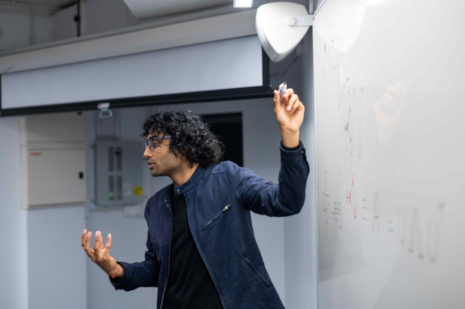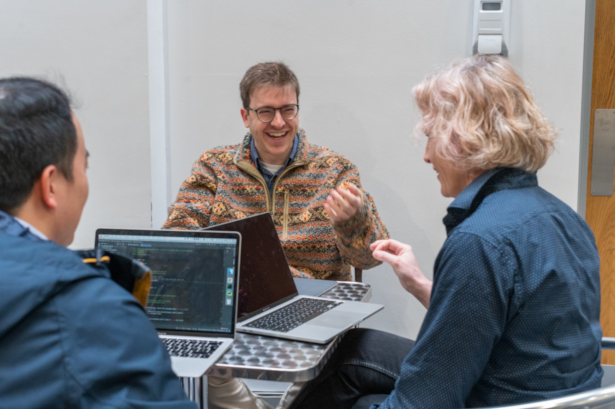Why Computer Science at Oxford?
The Department of Computer Science has long been recognised as the internationally leading centre of research and teaching across a broad spectrum of computer science. It is one of the longest-established departments of its kind in the country, within a world-leading university.
Outstanding teaching

By studying Computer Science at Oxford, you will receive the very best teaching from the finest minds in the field. The department has been ranked as the world's leader in computer sciences for seven years in a row by the Times Higher Education.
Not only will you learn from leading computer science specialists and researchers, but you will also get the opportunity to develop project work based on what you have learnt, ensuring you can apply your theoretical knowledge to important real-world challenges.
Our teaching focuses on theory, especially at undergraduate level, as we know how important it is for you to understand the principles of computer science and the mathematical foundations that underpin them. These principles will facilitate your understanding of technologies old and new, and provide you with the core knowledge you require to set about developing technologies to solve everyday problems.
You can choose from a wide range of courses, depending on your level and interests, and will be taught in small groups, using state of the art equipment and lab space.
World-leading research
The department is world-leading centre of research in computer science and our work has a major impact across the world. Many of our academic and teaching staff are recognised as international leaders and, as a student, you will be a part of this exceptional environment, and benefit from the department's activities and expertise.
Our latest rating by the UK's assessor of research in higher education, the Research Education Framework, saw 81% of our activity ranked as 4* (world-leading) and the rest as 3* (internationally excellent). Our research is interdisciplinary, with close collaborative links with engineering, mathematics, physics, and the life sciences. We play a leading role in national research initiatives, such as the Alan Turing Institute.
Your learning within this unique environment will equip you to use your study to make a difference within the field of computer science and beyond, providing you with the best career and research opportunities, and standing you in excellent stead for the future.
Strong industry links

As an Oxford Computer Science graduate, you will be extremely sought after, thanks to our strong industry links and reputation for excellence.
Our researchers and faculty work in collaboration with an impressive array of industry, academic and governmental partners, sharing knowledge and working together to solve tomorrow's problems, today. Partner institutions in our research include Samsung, AWS, Morgan Stanley, Intel, Dyson, GSK, Google DeepMind, and other leading universities including UC Berkley, and the Universities of Pennsylvania and McGill. Our staff also contribute to international academic networks such as European Laboratory for Learning and Intelligent Systems (ELLIS) and established and ongoing collaborations with international research centres such as the Max Planck Institute, and the Sirius SFI (Centre for Research-based Innovation) at the University of Oslo.
There is also an annual Careers in Computing fair, where companies meet students in the hope of recruiting them for jobs and internships. These exhibitors have included big name global companies such as Cisco, Google, IBM, Credit Suisse, Bloomberg, Fujitsu and Vodafone, plus charities and start-ups. Additionally, Oxford's Entrepreneurship Centre provides students with free courses, conferences and networking opportunities.
The outstanding mix of people
Studying Computer Science at Oxford, you will meet an outstanding mix of people, and join a community where you will live and study alongside people who are just as passionate about your subject as you. Learning and debate doesn't stop when you leave the lecture theatre.
We have around 375 undergraduate students across our three programmes. There are roughly equal numbers of students on the Computer Science and the Mathematics & Computer Science degrees, and a smaller cohort taking the degree in Computer Science & Philosophy.
We offer two full-time taught graduate courses: the MSc in Advanced Computer Science and the MSc in Mathematics and the Foundations of Computer Science (administered by the Maths Institute). Two part-time graduate programmes for professionals are also offered: the MSc in Software Engineering and the MSc in Software and Systems Security. Our Masters' students number more than 400.
The department's doctoral programme has around 270 research students studying for a DPhil (the Oxford term for a PhD), working across a wide range of subjects in Computer Science and Software Engineering.
The department is also home to more than 150 academic and research staff.
Find out more about our people and our history.
Watch the video: A history of computer science at Oxford
During term-time the department hosts regular seminars and lectures, often given by visiting international speakers, which you are welcome to attend.
The Oxford University Computer Society (Compsoc) is a student-run society, which organises social events, talks, and practical courses. The Oxford Womxn in Computer Science Society (OxWoCS) exists for all women and gender minorities in computer science, be they students, faculty, or staff. OxWoCS runs several academic, social, and career events throughout the year, including weekly coffee meetings, talks by distinguished female speakers, and industry sponsored events.
Want to know what it's like to study at Oxford University?
You may already know you want to study Computer Science, but want to learn more about the unique learning environment of the historic university. Find out more.
